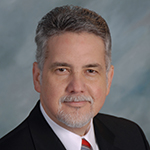
Jesse Roman, MD
The crisis in the Middle East has raised awareness about the challenges encountered by migrant populations, especially their access to health care. Migrant populations around the world, including those from Mexico and Latin America entering the United States, face similar challenges.
“War, economics, and geopolitical factors have forced hundreds of thousands away from their lands and families into countries that are often unprepared to care for their needs,” says Jesse Roman, MD. “The ATS and its Health Equality Subcommittee are concerned about the respiratory health of these populations. They are likely to suffer from tobacco-related disorders, asthma, pulmonary infections, sleep-disordered breathing, and critical care illnesses.”
Dr. Roman and three other physicians are leading “Respiratory Health in Migrant Populations,” which will raise awareness about health care access and delivery in migrant populations. The symposium will be from 1:30 to 3:30 p.m. Wednesday in the Moscone Center, Room 2009/2011 (West Building, Level 2).
“The burden of respiratory disease in migrants is essentially unknown, and appropriate models for delivering health care to these populations have yet to be implemented and tested. The speakers will address the burden of respiratory disease in these populations and the problems encountered in their care,” says Dr. Roman, professor and chair of medicine, professor of pharmacology and toxicology, and chief of the Division of Pulmonary, Critical Care, and Sleep Disorders Medicine at the University of Louisville, Kentucky.
The symposium will address the health inequality in Latinos crossing the border, the impact of asthma and sleep-disordered breathing, and infectious diseases in refugee populations and survivors of torture. It also will highlight the use of tele-health in pulmonary and critical care settings in Syria.
“Considering the widespread nature of this problem, we are hopeful audience members will return to their workplaces equipped with new knowledge, enabling them to identify problems and tackle them adequately,” Dr. Roman says. “Importantly, we hope to raise enthusiasm among trainees interested in devoting their efforts—and perhaps their careers—to these important issues.”
